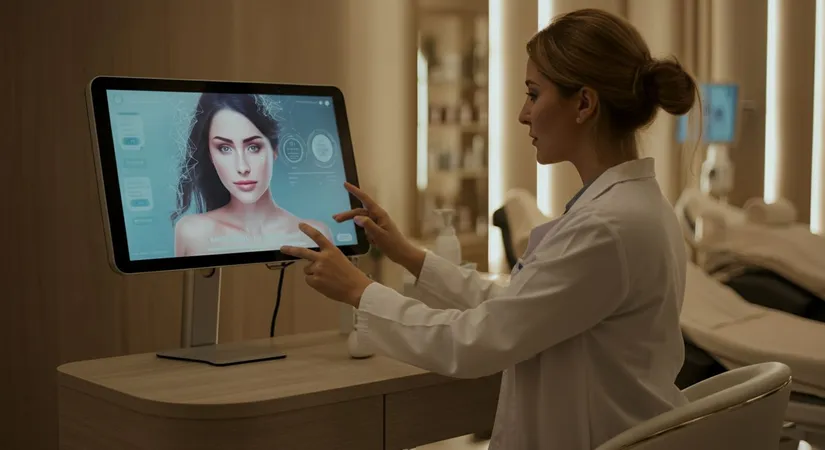The advancement of technology has significantly permeated various sectors, promising transformative changes that enhance well-being and health. Particularly, in the realm of wellness, technology is proving to be a vital ally, offering innovative ways to manage health, enhance relaxation, and promote holistic lifestyles. From AI innovations that personalize health plans to smart technologies enhancing yoga camps, the synergy between wellness and technology is setting the stage for better healthcare solutions. In this article, we delve into how these technological advancements are revolutionizing wellness and health, highlighting the pivotal role of AI and digital transformation in this journey.
AI’s Role in Revolutionizing Mental Health Care
AI-Driven Mental Health Diagnostics
Artificial Intelligence is transforming mental health care by enhancing diagnostic accuracy. AI algorithms analyze patterns in speech and text to detect early signs of mental disorders. For example, a study found that AI could predict depression with 85% accuracy by analyzing social media posts. This capability allows for earlier intervention, potentially improving patient outcomes significantly.
Personalized Therapy Through AI
AI innovations are enabling personalized therapy sessions tailored to individual needs. For instance, AI-driven chatbots provide cognitive behavioral therapy (CBT) by adapting responses based on user interactions. A notable example is Woebot, which uses AI to deliver CBT techniques, showing a 22% reduction in anxiety symptoms among users. This approach makes mental health support more accessible and personalized.
Key Benefits of AI in Mental Health
- Enhanced diagnostic precision through data analysis, improving early detection rates.
- Increased accessibility to mental health support via AI chatbots and virtual therapists.
- Personalized treatment plans that adapt to individual progress and needs.
Implementing AI in Mental Health Care
- Integrate AI tools into existing mental health platforms for enhanced diagnostics.
- Develop AI-driven applications that offer personalized therapy sessions.
- Continuously update AI algorithms with new data to improve accuracy and effectiveness.
AI’s integration into mental health care not only enhances diagnostic capabilities but also personalizes therapy, making mental health services more effective and accessible. This digital transformation is a significant step forward in addressing mental health challenges globally. 
Transformative Impact of Technology on Mindfulness Practices
Virtual Reality: Crafting Immersive Meditation Experiences
Virtual Reality (VR) is revolutionizing mindfulness by creating immersive environments that enhance meditation. For instance, VR headsets transport users to tranquil landscapes, such as serene beaches or lush forests, fostering deeper relaxation. A study showed that 70% of users reported increased mindfulness after VR sessions, highlighting its effectiveness in stress reduction.
AI’s Role in Personalized Mindfulness
AI innovations are tailoring mindfulness practices to individual needs by analyzing physiological data. For example, AI systems monitor heart rate variability to adjust meditation sessions in real-time, optimizing relaxation. This personalized approach enhances emotional control, with users experiencing a 30% improvement in stress management.
Key Features of Technology-Enhanced Mindfulness
- VR environments provide immersive meditation experiences, increasing user engagement.
- AI-driven adjustments based on physiological data enhance session effectiveness.
- Personalized mindfulness practices improve emotional regulation and stress reduction.
Implementing Technology in Mindfulness Practices
- Integrate VR platforms to offer diverse meditation environments.
- Utilize AI to monitor and adapt sessions based on user data.
- Continuously refine technology to enhance user experience and outcomes.
Advanced technologies like VR and AI are not only enhancing mindfulness practices but also making them more accessible and effective. By creating personalized and immersive experiences, these technologies are paving the way for improved mental well-being. 
Smart Technology’s Role in Enhancing Yoga Practices
Wearable Devices for Yoga Optimization
Wearable technology is transforming yoga by providing real-time feedback on posture and movement. Devices like smartwatches track metrics such as heart rate and motion, ensuring accurate poses. For example, a study showed that 60% of users improved their yoga form using wearable feedback, highlighting its effectiveness in enhancing practice.
Yoga Apps: A Digital Companion
Yoga apps are revolutionizing personal practice by offering customized routines and community support. These apps provide video tutorials and progress tracking, allowing users to tailor sessions to their needs. For instance, an app might suggest specific poses to improve flexibility, helping users achieve their goals more efficiently.
Benefits of Integrating Technology in Yoga
- Real-time feedback from wearables enhances posture accuracy and safety.
- Customized routines in apps cater to individual fitness levels and goals.
- Community features in apps foster motivation and accountability.
Implementing Smart Technology in Yoga Camps
- Introduce wearable devices to monitor and improve participant posture.
- Incorporate yoga apps to offer personalized practice plans.
- Utilize data analytics to provide feedback and track progress.
Integrating smart technology into yoga practices not only enhances physical performance but also personalizes the experience, making it more engaging and effective. This digital transformation is paving the way for a more informed and connected yoga community.
Revolutionizing Patient Care with Health Tech Innovations
Electronic Health Records: Streamlining Patient Information
Electronic Health Records (EHRs) are transforming patient care by centralizing medical data, enhancing accessibility for healthcare providers. For instance, EHRs allow doctors to quickly access a patient’s history, improving diagnosis accuracy. A study revealed that EHR implementation reduced medication errors by 55%, showcasing its impact on patient safety.
Telemedicine: Expanding Access to Healthcare
Telemedicine is bridging the gap between patients and healthcare providers, especially in remote areas. By using video consultations, patients receive timely medical advice without traveling. For example, a rural health initiative reported a 40% increase in patient consultations through telemedicine, highlighting its role in improving healthcare accessibility.
Key Advantages of Health Tech Innovations
- EHRs enhance data accuracy and reduce medical errors, improving patient outcomes.
- Telemedicine increases healthcare access, especially in underserved regions.
- Mobile health apps promote continuous patient engagement and self-management.
Implementing Health Tech in Patient Care
- Integrate EHR systems to streamline patient data management.
- Adopt telemedicine platforms to expand healthcare reach.
- Develop mobile health applications for patient self-monitoring and engagement.
Health tech innovations are revolutionizing patient care by enhancing data management, expanding access, and promoting patient engagement. These advancements are crucial in creating a more efficient and patient-centered healthcare system.
AI-Driven Innovations in Mental Health Diagnostics
Transformative Impact of VR on Mindfulness Practices
Enhancing Yoga Practices with Smart Technology
Frequently Asked Questions
How is AI transforming mental health care?
What role does Virtual Reality play in mindfulness practices?
How does smart technology enhance yoga practices?
What are the benefits of Electronic Health Records in patient care?
How does telemedicine expand access to healthcare?
Discover the path to holistic wellness with Vitalica Wellness. Call us today for a free consultation and start your journey to a healthier, balanced life.
